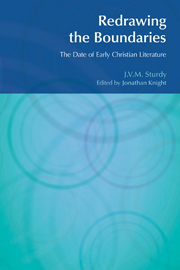Book contents
- Frontmatter
- Contents
- Preface
- Abbreviations
- 1 The Problem Posed
- 2 1 Clement
- 3 The Letters of Ignatius
- 4 Polycarp
- 5 Early Christian Literature: Some Parameters of Date
- 6 The Relationship of the Synoptic Gospels
- 7 Mark
- 8 Luke
- 9 Matthew
- 10 Acts
- 11 The Pauline Corpus: Its Growth and Development
- 12 The Catholic Epistles
- 13 Johannine Literature
- 14 Summary and Conclusions
- Appendix
- Notes
- Bibliography
- Index of Names
- Index of References
10 - Acts
- Frontmatter
- Contents
- Preface
- Abbreviations
- 1 The Problem Posed
- 2 1 Clement
- 3 The Letters of Ignatius
- 4 Polycarp
- 5 Early Christian Literature: Some Parameters of Date
- 6 The Relationship of the Synoptic Gospels
- 7 Mark
- 8 Luke
- 9 Matthew
- 10 Acts
- 11 The Pauline Corpus: Its Growth and Development
- 12 The Catholic Epistles
- 13 Johannine Literature
- 14 Summary and Conclusions
- Appendix
- Notes
- Bibliography
- Index of Names
- Index of References
Summary
The study of Acts poses a serious problem for researchers. Authorship is not the only question we must consider. The question of authorship, of course, depends in no small measure on the date we assign to the text. The two are interconnected. The differences of language and theology indicate almost beyond doubt that Luke (the author of the third Gospel) is not the author of the Acts of the Apostles. I shall now consider the issues that arise from this assertion.
The Character of Acts
The Acts of the Apostles is a lengthy account of (some aspects of) the development of the first generation Church. It is not in fact an account of the Acts of the Apostles in the broad sense. Its title is misleading (and there is no reason to think that it was supplied by the original author). Only a very few apostles are described in any detail in Acts. Many of the Twelve are hardly mentioned there at all. Some of the principal figures who are mentioned (e.g. Stephen) are not apostles, and the text itself gives every sign of arrangement according to a particular scheme.
The real heroes of Acts are Peter and Paul. These figures have significance, not precisely in their own right, but because of their significance in the history of the spread of Christianity in its first generation. Acts ends with Paul's free preaching of the Christian gospel in the Roman capital.
- Type
- Chapter
- Information
- Redrawing the BoundariesThe Date of Early Christian Literature, pp. 49 - 53Publisher: Acumen PublishingPrint publication year: 2008



